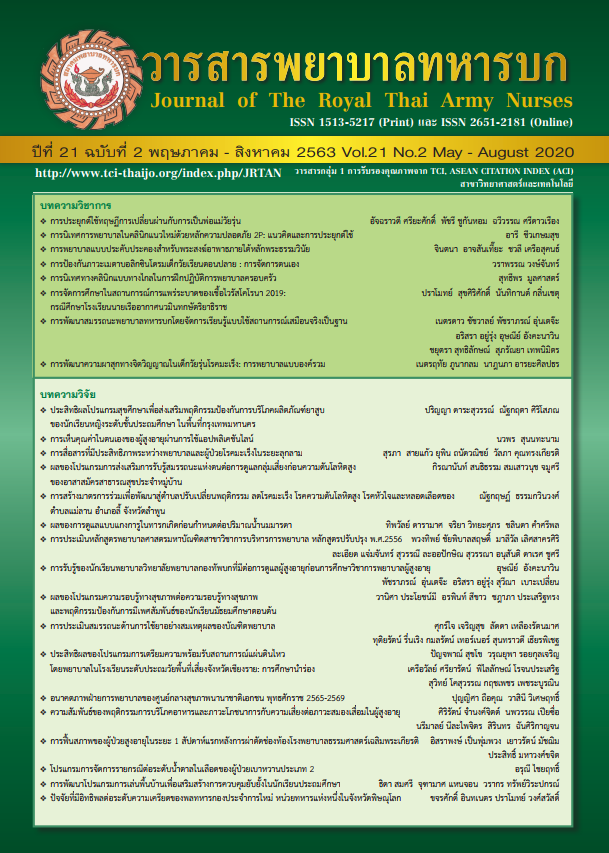Factors Influencing Stress level of The New Troops, The Military Unit In Phitsanulok Province
Keywords:
Stress, New TroopsAbstract
This descriptive research aimed to determine factors influencing stress levels of the new troops at 4 th Infantry Division, Fort Somdej Pra Naresuan Maharaj, Phitsanulok Province. The samples were 410 new troops calculated based on the estimating population proportion. Simple random sampling technique was used to recruit the samples. The research tool was a questionnaire created by the researcher and its quality was tested in terms of content validity and reliability which met the standard criteria. Data were analyzed using descriptive statistics and ordinal logistic regression, defining statistical significance at .05 as a criterion for accepting hypothesis.
The results showed that the new troops had stress at mild stress level 66.8%, relationships with other people are at a good level, adaptation is at a moderate level, perception about military is at a high level, attitude towards military training is at a moderate level. Factors influencing the stress levels of the new troops are consisted of firstly, family responsibility, emotional quotient; decision and solving problems, emotional quotient; life satisfaction, relationship with the trainers, personal and emotional adaptation and lastly, military role recognition in the treatment of adults with statistical significance level of .05. These factors could predict the stress levels of new troops by 36%.
Downloads
References
Department of Mental Health, Ministry of Public Health. Annual Report, Department of Mental Health, Fiscal Year 2016. Bangkok; 2017. (in Thai).
Kongburan P. Factors Affecting on Adjustment of New Privates of the Third Infantry Battalion of the First Infantry Division of the King’s Own Bodyguard, Bangkok. Master Thesis, M.Ed. (Educational Psychology). Bangkok: Srinakharinwirot; 2008. (in Thai).
Nualsuwan K, Prasittivatechakool A, Prajankett O, Stress and Coping Strategies of The Royal Thai Army New Privates. Journal of The Royal Thai Army Nurses. 2012; 13(2): 72-81. (in Thai).
Poomsanguan K, Paikoh K, Nurses and Development of Emotional Quotient. Journal of The Royal Thai Army Nurses. 2014; 15(3): 18-23. (in Thai).
Roj asavasathien R, Thep Wichaisilapakul M. Relationship between Emotionnal Quotient, Stress, GPA and Comprehensive Test Score of Students Graduated from Sirindhorn College of Public Health Trang. Sirindhorn College of Public Health Trang. Trung; 2010. (in Thai).
seehawong S, and others. Factors Causing to Stress of Nursing Students, Ubon Ratchathani University. Journal of the Academic, 2018; 21(42): 93-106 (in Thai).
Siangpror P, Rawiworrakul T, Kaewboonchoo O. Factors correlated to job stress among nurses in specialised cancer hospitals, central region of Thailand. Journal Of the health science reserech 2014; 8(1): 17-27 (in Thai).
Wajanatinnapat P. and et al. Stress, copingstrategies, and the achievement of nursingstudents, The Royal Thai Army Nursing College. Journal of The Royal Thai Army Nurses. 2009; 10(1): 24-31. (In Thai)
Wayne W.,D. Biostatistic : A foundation of analysis in the health science (6th ed.). John Wiley & Sons; 1995 Inc., 177-178.
Downloads
Published
How to Cite
Issue
Section
License
บทความหรือข้อคิดเห็นใดใดที่ปรากฏในวารสารพยาบาลทหารบกเป็นวรรณกรรมของผู้เขียน ซึ่งบรรณาธิการหรือสมาคมพยาบาลทหารบก ไม่จำเป็นต้องเห็นด้วย
บทความที่ได้รับการตีพิมพ์เป็นลิขสิทธิ์ของวารสารพยาบาลทหารบก
The ideas and opinions expressed in the Journal of The Royal Thai Army Nurses are those of the authors and not necessarily those
of the editor or Royal Thai Army Nurses Association.






